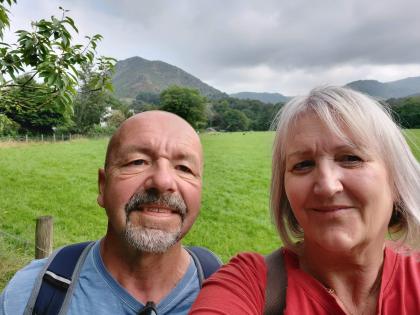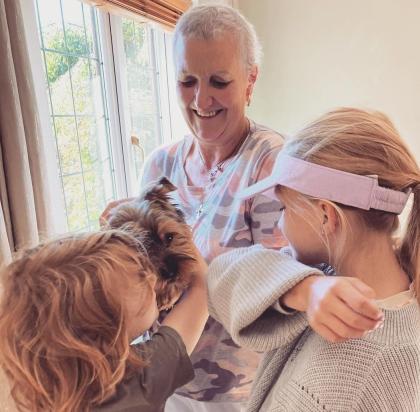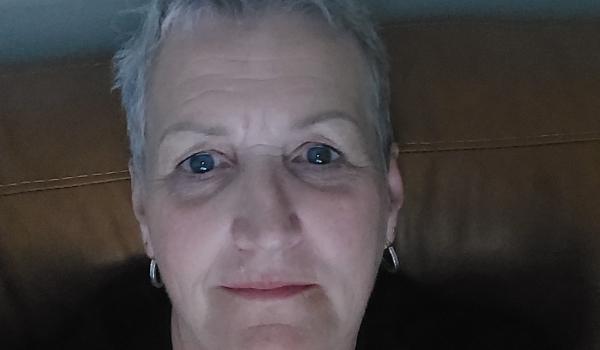I found Target Ovarian Cancer when I was looking for hope and positivity. Hope was all I wanted to hear when I was diagnosed with stage IV ovarian cancer.
My diagnosis
Cancer. It’s that word that gives people fear. You think you’re going to die.
I was diagnosed with ovarian cancer a year to the day after my sister, Gillian. Gillian is my younger sister and we both carry the BRCA2 gene mutation. Neither of us knew.
Fortunately, our other sister doesn’t carry the gene, but as we’ve started to talk about it more, we've discovered that the gene has come hidden down my dad’s side of the family. Two of his cousins died of gynaecological cancers.
Hindsight
I could kick myself now, but that’s the beauty of hindsight. I should’ve gone in a lot sooner, as soon as I noticed things were changing, as soon as I found out there was a risk that I could have the BRCA gene, and especially because my mum had cervical cancer too. But I didn’t.
It wasn’t until October 2021, a couple of months after the symptoms started, that I got in touch with the GP, when I had little stabbing pains low down in my abdomen.
The consultation was by phone, and the doctor suspected I had diverticulitis – a digestive condition that affects the large intestine. Despite giving me some medication, it didn’t help. The doctor told me to come in and when I did, he pressed on my stomach and I shot off the bed. I was in severe pain.
After a concerning stool sample combined with a high CA125 blood test result, I was sent to the hospital. I had an ultrasound which showed that I had ascites, a build-up of fluid which can be caused by cancer. They had found ascites in Gillian’s ultrasound too.
Just before Christmas Day I went in for a laparoscopy, a procedure where the surgeon can have a better look at what was going on inside. On 6 January, a year to the day Gillian was diagnosed, the doctor confirmed I had ovarian cancer. I had neoplasia throughout my bowel – a mass of tissue caused by cells which grow and divide. It was scattered like salt and pepper.
Treatment
Right there, in that room, I had to make a split decision as to what I did next. My options were to either have surgery followed by chemo, or chemo followed by surgery then more chemo. I asked my consultant for advice.
‘Make the decision, it’s your decision.’ I was on my own, having just received this news and now had to make a huge life decision. I needed some guidance.
We had a frank conversation about what may or may not happen. The potential of a stoma, the potential loss of multiple organs.
For me, the right decision was to start off on chemo. It was delayed by six weeks in which time my CA125 rose to 854. I was almost able to kid myself that nothing was happening during those weeks. I didn’t feel much different to before and lived in hope. It’s going to start ‘this week’, I’d think. When that week passed, ‘this is the week’ I’d tell myself.
Chemo started well at first, but the ascites caused a collapsed lung, and I also had an allergic reaction to one of the rounds of chemo. Having said that though, slowly but surely my CA125 started to drop – down to the 500s, then the 200s, then the 100s. I went from thinking I wasn’t going to be able to be treated to, ‘I will be treated’.
Living in denial
My husband, Keith, didn’t have long to live when I was diagnosed. He had cancer too. Looking after him, and making the most of our time together, I didn’t have much time to think about my own cancer. He told me I was in denial, and I was… about him dying, and my own diagnosis.
I coped by taking everything a day at a time. We even bought a caravan and spent 13 weekends away, creating beautiful memories.
Keith died on 10 April, and there wasn’t much time for me to grieve as six weeks later I was in theatre undergoing a nine-hour operation to remove anything that the cancer had touched.

The positives
It’s been 11 weeks since my surgery and I have just had a call to say I’m NED – no evidence of disease. I cried.
I felt so guilty. It was the first thing I felt because Keith died and I’m here. I know he wouldn’t want me to feel like this, that this is my journey, and I was meant to come through this. Still, it's something that lingers there.
I am starting on Olaparib – a PARP inhibitor – which I'll be on for two years. Alongside that, I’m going to see a psychologist to help process feelings of anxiety. I’m anxious that my daughter, my granddaughter and my nieces might have the BRCA gene. I’m anxious that something could go wrong. I’m anxious that ovarian cancer might come back.

Talking will help - and it does help. Being a part of the Target Ovarian Cancer Community on Facebook has been a support, especially when I’ve felt a bit down. Reading someone else’s story has helped to know what to expect, in terms of things like chemo and reoccurrence.
I was under the impression chemo was a horrible thing. It wasn’t pleasant, my hair did fall out, but every time I had chemo a few days later I would be back to my usual self. However ill I was feeling I always thought it was better than the alternative.
So much research has gone into ovarian cancer now - that's given me hope. There are treatments that are simply amazing. I'd encourage anyone to not let the word cancer take their focus and remember that everyone reacts to cancer differently.
The best way to deal with a diagnosis is to forget the word cancer, think about how it can be treated and the progress that’s been made.
If you’ve been affected by this story and would like to speak to a specialist nurse, you can call our dedicated support line on 020 7923 5475 or contact us: [email protected]. We're open from 9am until 5.30pm, Monday to Friday.
If reading this story has helped you, join the Ovarian Cancer Community to connect with more people affected by ovarian cancer: www.targetovariancancer.org.uk/onlinecommunity



